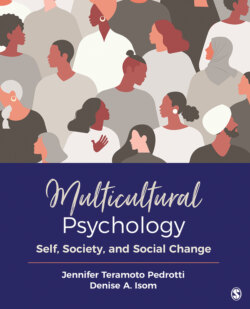Читать книгу Multicultural Psychology - Jennifer T. Pedrotti - Страница 49
На сайте Литреса книга снята с продажи.
Time Orientation
ОглавлениеValue system is not the only cultural trait that impacts worldview. The way a culture thinks about time is also influential. In the United States, the focus is most often on the future in terms of time, particularly in a European American mindset. Most questions are of the “where are you going” ilk, as opposed to the “where have you been.” Making plans for the future, saving for retirement (often to the detriment of current life experience), and future goals often dominate our perspective. When individuals in the United States exhibits this mindset, we might call them go-getters or high achievers.
Other cultural groups may have more of a focus on the past. Asian cultures, for example, often have a stronger value for a past time orientation and may look backward to ancestors and past family events to give meaning to their present. Consider the old Chinese fable, “The Old Horse Knows the Way.” In this story, a group of warriors has been to war for many years, and when at last it is time for those of them who are left to return home, they become lost. One of the soldiers realizes: “We can use the wisdom of an old horse. Release the old horses and follow them and thereby reach the right road” (Pei, 2005, p. 1). In this cultural group, looking backward and to those who know the past leads to answers and is valued.
Finally, some cultural groups are more focused on the present. Many American Indian groups, for example, take the approach to time that “something happens when it happens” as opposed to thinking of a specific starting time as important. More examples are given in our later discussion of the value of time orientation in relation to worldview models, but this basic information helps us to understand that time and the way it is valued is often dependent on culture.
